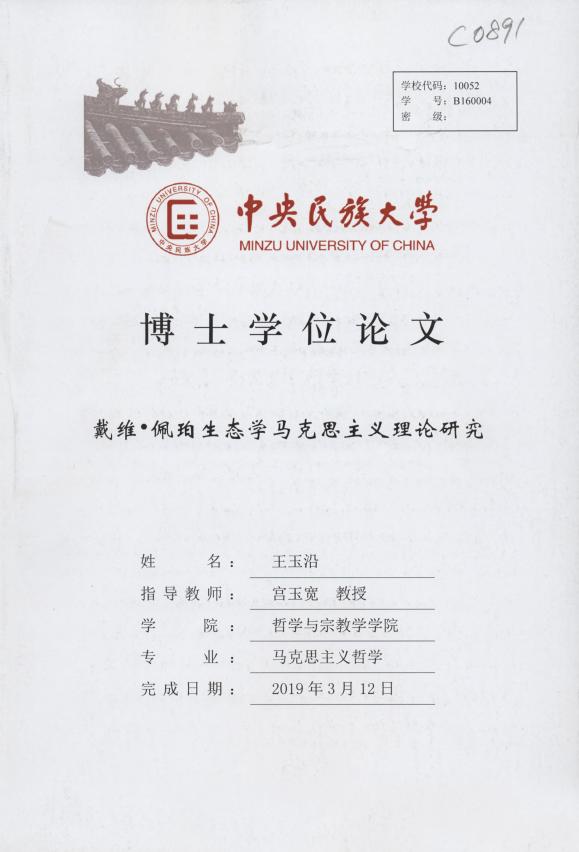| 英文摘要 |
The relationship between man and nature is one of the basic relationships that people face. According to Marxism, the relationship between man and man is based on the relationship between man and nature, because the fundamental driving force of the whole social movement lies in the inherent contradiction of social production mode. The development of productivity is the ultimate driving force for society, and productivity is the category that marks the relationship between man and nature. The industrial revolution that began in the 1840s led to tremendous growth in human material wealth and brought many environmental problems. With the continuous advancement of the world's industrialization, these problems have become increasingly acute. Problems such as lack of resources, energy shortage, serious pollution, and imbalance of ecological environment have seriously threatened the survival and sustainable development of human beings. Ecological problems have become global and contemporary. "Any true philosophy is the essence of the spirit of your own time" and "is the living soul of civilization." In the face of the problems of the times, we need to think about the premise and reasons for the problems. We need to fundamentally examine and criticize the relationship between man and nature. We need to use the theory of Marxist philosophy to guide the solution of the relationship between man and nature. With the changes in the history and social specific conditions, Marxist philosophy also needs to develop, and it needs to provide solutions for the new era. The Ecological Marxism that emerged in the 1970s combines Marxist theory with ecological issues in different ways, hoping to analyze and solve ecological problems through Marxist theory, whose path is to criticize the contemporary capitalist system with the aim of protecting humanity survival homeland - nature, and to build a new ecological theory paradigm to establish a new type of Ecological Socialist society. David Pepper (1940--) is a professor at the Department of Geography at Oxford Brookes University in the UK. He is a representative of the third stage of Ecological Marxism. His main theoretical innovation lies in the in-depth discussion of Ecological Socialism and Ecocentrism. The difference between the two principles is a careful distinction between the "Red Green Party" and the "Green Green Party" political proposition. David Pepper criticized the misunderstanding of "Green Molecules" for Marxism - Marxism is mechanical determinism, ignoring humanism and spiritual dimensions. He insisted on transforming the green movement with Marxist theory, believing in the concept of Practice, Objective Dialectics (the characteristics of things and phenomena lie in their movements and conflicts), Historical Materialism, Capitalism and Socialism, and argued that Marxist theory was the solution, and the correct way of resolving the ecological crisis. And it is considered by Pepper that only Marxism can truly solve environmental problems, thus, he advocated "green red", and specifically put forward the concept of Ecological Socialism, and clearly showed the social blueprint of Ecological Socialism. David Pepper's Ecological Marxism thought has had a great influence in the academic and theoretical circles and also has an important position. Studying David Pepper's ecological Marxist thought has important theoretical value for the current construction of China's ecological civilization and has a strong practical significance. This paper is divided into the introduction part, the social historical background and theoretical source of David Pepper's thought, David Pepper's main thought, the analysis of David Pepper's thought, the relationship between David Pepper's thought and the construction of social civilization with Chinese characteristics, and finally the analysis part of the entire article. The introduction introduces the significance, research status and review, research ideas, research methods, innovations and difficulties of this paper. The first chapter is the social background and theoretical source of David Pepper's Ecological Marxism thought. This chapter first briefly introduces the outbreak of capital social ecological crisis and the emerging green movement aiming at solving the ecological crisis. There is no doubt that it is the outbreak of ecological crisis and people's increasing awareness of ecological crisis with a series of actions that have given the spirit of the times a green mark. David Pepper not only absorbed the related ecological theories of Marx and Engels’, but also sublated the thoughts of some other Ecological Marxists, and then he gradually created his own theory of solving ecological crises. The second chapter is David Pepper's thought about the ecological crisis of capitalism. This chapter first introduces Pepper's critique of the two mainstream theories of analyzing ecological crisis in the green movement. On this basis, Pepper analyzes the essence of the capitalist ecological crisis from multiple dimensions, and finally summarizes the root causes of the capitalist ecological crisis- Capitalist Production Mode. The third chapter is David Pepper's thought on the construction of Ecological Socialism. It is deemed that the value orientation of Ecological Socialism is the new anthropocentrism, whose realization approach is the alliance of “red” and “green”, and finally he put forward the conception of Ecological Socialist society. The fourth chapter is mainly the author's evaluation of David Pepper's Ecological Marxism theory, including the progressive significance and limitations of his theory. The progressive significance of his theory includes the massive boost for Marxist theory and innovative thoughts on solving ecological problems. And limitations are reflected on that Pepper fails to fully understand Marxism as a Western scholar, who is deeply influenced by the Western cultural traditions, and shows a certain compromise to the capitalist ruling relationship with eclecticism in his theory. The fifth chapter is about the author’s construction of the relationship between David Pepper's ecological theory and the construction of China's socialist ecological civilization in the overall structure and general content, and explores the significance of his theory to the ecological civilization construction in China, and its philosophical innovation of solving the ecological crisis. The conclusion is the author's summary of the content of the whole article. Keywords: Ecological Crisis; Green Movement; Marxist Ecological Theory; Construction of Ecological Civilization
|

